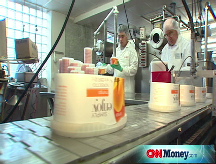Surviving the recession: One entrepreneur's playbook
I've been in business for 30 years, so I've lived through several downturns. You need the right outlook.

(Fortune Small Business) -- All through the summer I thought maybe I was dodging a bullet.
There was talk of recession, but my Chicago picture-framing and home-furnishings businesses - 120 employees, about $15 million in revenue - were doing fine. Then the stock market crashed, and my dashboard software showed sales taking a hit.
Unlike in previous recessions, I didn't scratch my head and wonder what to do. I immediately started cutting expenses and staffing.
The first time I went through a recession, in the '80s, I didn't know what to expect. Obviously business slowed, but I wasn't sure how to react because the changes were subtle at first. Everything looked and felt the same. If you're in manufacturing, your employees don't come to you and say, "Hey, boss, I'm going to be done around three o'clock. Should I go home early?" They stretch the work out. The activity is unchanged - until you run the numbers at the end of the month.
If your revenue is off about 10%, that might not sound so bad. But because of fixed costs such as rent, that 10% decline can easily wipe out 100% of your profit. The big surprise comes if you don't make changes. In my case, most of my fixed costs were fixed, but I could have cut payroll. I didn't, and I paid dearly. There's an old saying, "Smooth seas make a poor sailor." Once you've weathered a few economic storms, you learn how to adapt. Here are some suggestions that might help you.
I recently asked one vendor for a discount if I paid on delivery instead of the standard 30 days later. The salesperson was skeptical but called back after five minutes offering 10%. That's a huge savings. It turned out this particular vendor had 30 accounts that were more than 90 days overdue. The lesson? Opportunities present themselves during recessions.
Not long ago I bought a machine that shreds discarded cardboard for use as packing material. It's saving me $10,000 a year (while producing less landfill). But here's the thing: You should always be looking for savings and efficiencies - not just when times are tough but even when you're growing. Growth can mask problems. Are you on top of purchasing? Shopping around aggressively? Adopting new technologies that can help your business run more efficiently? Spending your marketing dollars wisely?
I've also saved by cutting back on Yellow Pages advertising in recent years - I think new media offers a better return. But don't be tempted to gut your advertising. Companies that continue to advertise come out ahead after a recession, according to studies by McGraw-Hill Research. And that makes sense: If your competitors are in retreat, you can build your market presence.
Instead of cutting advertising when my sales fell last fall, I checked inventories. I realized that I needed to put my home furnishings on sale faster. I used to wait at least six months before discounting a product. Now if something doesn't sell, it usually goes on sale in four. That's another lesson I learned the hard way: You can survive decreased profits if you have cash flow, but the converse is not true - if cash flow takes a dive, you're in trouble.
That will happen if you let your receivables or your inventories get out of control, which is surprisingly easy. That's because most small businesses are driven by sales. In good times, you never want to lose a sale by not extending credit or by running out of an item. But if you're not vigilant when sales slow, that mentality can fill your warehouse and empty your checking account.
That concern recently drove me to the managers of my framing facility, who reported that they'd just cut employee hours across the board. I told them to consider laying off someone instead. Cutting everyone's hours might sound fair and reasonable, but it can do more harm than good. What happens is that everybody suffers, and eventually somebody quits. Too often it's the best person in the department who walks. I'd rather be in control of who stays and who goes.
That's part of being a leader, which is what your employees want and need. Times may be tough right now, but they will get better. In the meantime, don't make the mistake I made in my first recession. Take action. You have more power than you might think.
Jay Goltz employs 120 people at Artists Frame Service, Chicago Art Source and Jayson Home & Garden, all based in Chicago. He is the author of The Street-Smart Entrepreneur (Addicus Books). ![]()
-
The Cheesecake Factory created smaller portions to survive the downturn. Play
-
A breeder of award-winning marijuana seeds is following the money and heading to the U.S. More
-
Most small businesses die within five years, but Amish businesses have a survival rate north of 90%. More
-
The 10 most popular franchise brands over the past decade -- and their failure rates. More
-
These firms are the last left in America making iconic products now in their twilight. More










